| Listing 1 - 10 of 52 | << page >> |
Sort by
|
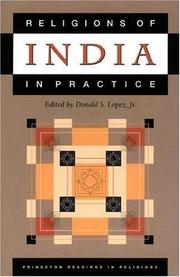
ISBN: 0691043248 9780691043241 Year: 1995 Volume: *1 Publisher: Princeton, N. J. Princeton University Press
Abstract | Keywords | Export | Availability | Bookmark
 Loading...
Loading...Choose an application
- Reference Manager
- EndNote
- RefWorks (Direct export to RefWorks)
India --- Religion --- India - Religion
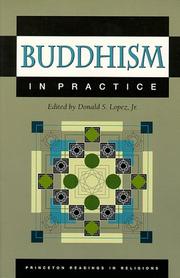
ISBN: 0691044414 9780691044415 Year: 1995 Volume: *2 Publisher: Princeton, N. J. Princeton University Press
Abstract | Keywords | Export | Availability | Bookmark
 Loading...
Loading...Choose an application
- Reference Manager
- EndNote
- RefWorks (Direct export to RefWorks)
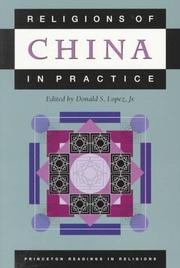
ISBN: 0691021430 0691021449 9780691021430 Year: 1996 Volume: *3 Publisher: Princeton (N.J.): Princeton university press
Abstract | Keywords | Export | Availability | Bookmark
 Loading...
Loading...Choose an application
- Reference Manager
- EndNote
- RefWorks (Direct export to RefWorks)
China --- Religion --- S13A/0200 --- 299.31 --- 299.51 --- China: Religion--General works --- Godsdiensten van de Oude Egyptenaren --- Godsdiensten van China--(uitgezonderd Boeddhisme) --- Religion. --- 299.51 Godsdiensten van China--(uitgezonderd Boeddhisme) --- 299.31 Godsdiensten van de Oude Egyptenaren --- China - Religion
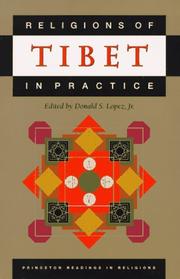
ISBN: 0691011842 0691011834 9780691011837 Year: 1997 Volume: *4 Publisher: Princeton, N. J. ; Chichester, UK Princeton University Press
Abstract | Keywords | Export | Availability | Bookmark
 Loading...
Loading...Choose an application
- Reference Manager
- EndNote
- RefWorks (Direct export to RefWorks)
Buddhism --- Buddhist literature, Tibetan --- Bouddhisme --- Littérature bouddhique tibétaine ) --- Translations into English --- Traductions anglaises --- Tibet Autonomous Region (China) --- Région autonome du Tibet (Chine) --- Religion --- Translations into English. --- Littérature bouddhique tibétaine ) --- Région autonome du Tibet (Chine) --- China --- Buddhist literature [Tibetan] --- Buddhism - China - Tibet. --- Buddhist literature, Tibetan - Translations into English.
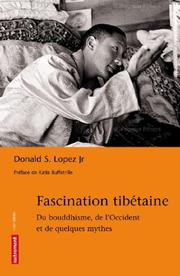
ISBN: 2746703440 9782746703445 Year: 2003 Publisher: Paris : Editions Autrement,
Abstract | Keywords | Export | Availability | Bookmark
 Loading...
Loading...Choose an application
- Reference Manager
- EndNote
- RefWorks (Direct export to RefWorks)
Buddhism --- Bouddhisme --- Influence --- Buddhism - China - Tibet Autonomous Region
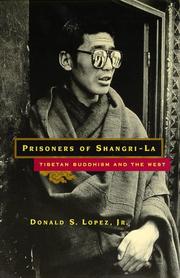
ISBN: 0226493113 9780226493114 Year: 1999 Publisher: Chicago (Ill.): University of Chicago press
Abstract | Keywords | Export | Availability | Bookmark
 Loading...
Loading...Choose an application
- Reference Manager
- EndNote
- RefWorks (Direct export to RefWorks)
Buddhism --- S24/0900 --- S02/0300 --- Tibet--Religion and philosophy --- China: General works--Chinese culture and the West and vice-versa --- Buddhism - China - Tibet Autonomous Region --- Tibet --- Tibetan lamas --- Tibetan independence --- Chinese occupation --- Tibetan Buddhism --- spirituality --- history --- Eastern religions --- Western culture --- Shambhala
Book
ISBN: 0824811615 9780824811617 Year: 1988 Volume: 6 Publisher: Honolulu University of Hawaii press
Abstract | Keywords | Export | Availability | Bookmark
 Loading...
Loading...Choose an application
- Reference Manager
- EndNote
- RefWorks (Direct export to RefWorks)
Hermeneutics --- -Buddhism --- Religious aspects --- -Doctrines --- Buddhism --- -Hermeneutics --- -Interpretation, Methodology of --- Criticism --- Buddha and Buddhism --- Lamaism --- Ris-med (Lamaism) --- Religions --- Doctrines --- Interpretation, Methodology of --- Buddhist doctrines --- Buddhist theology --- Lamaist doctrines --- Religious aspects&delete& --- Hermeneutics - Buddhism - Religious aspects --- Buddhism - Doctrines
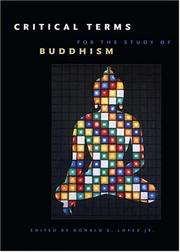
ISBN: 0226493148 0226493156 9780226493145 9780226493152 Year: 2005 Publisher: Chicago University of Chicago press
Abstract | Keywords | Export | Availability | Bookmark
 Loading...
Loading...Choose an application
- Reference Manager
- EndNote
- RefWorks (Direct export to RefWorks)
Over the past century, Buddhism has come to be seen as a world religion, exceeding Christianity in longevity and, according to many, philosophical wisdom. Buddhism has also increasingly been described as strongly ethical, devoted to nonviolence, and dedicated to bringing an end to human suffering. And because it places such a strong emphasis on rational analysis, Buddhism is considered more compatible with science than the other great religions. As such, Buddhism has been embraced in the West, both as an alternative religion and as an alternative 'to' religion. This volume provides a unique introduction to Buddhism by examining categories essential for a nuanced understanding of its traditions. Each of the fifteen essays here shows students how a fundamental term--from 'art' to 'word--'illuminates the practice of Buddhism, both in traditional Buddhist societies and in the realms of modernity. Apart from 'Buddha', the list of terms in this collection deliberately includes none that are intrinsic to the religion. Instead, the contributors explore terms that are important for many fields and that invite interdisciplinary reflection. Through incisive discussions of topics ranging from 'practice', 'power', and 'pedagogy' to 'ritual', 'history', 'sex', and 'death', the authors offer new directions for the understanding of Buddhism, taking constructive and sometimes polemical positions in an effort both to demonstrate the shortcomings of assumptions about the religion and the potential power of revisionary approaches. Following the tradition of 'Critical Terms for Religious Studies', this volume is not only an invaluable resource for the classroom but one that belongs on the short list of essential books for anyone seriously interested in Buddhism and Asian religions.
Buddhism --- Philosophy. --- Study and teaching. --- 294.32 --- Boeddhisme: doctrines --- Philosophy --- Study and teaching --- Buddhism - Philosophy. --- Buddhism - Study and teaching.
Book
ISBN: 1782685642 1282976389 9786612976384 1400838045 0691134359 9780691134352 9781400838042 9781282976382 Year: 2011 Publisher: Princeton, NJ
Abstract | Keywords | Export | Availability | Bookmark
 Loading...
Loading...Choose an application
- Reference Manager
- EndNote
- RefWorks (Direct export to RefWorks)
The Tibetan Book of the Dead is the most famous Buddhist text in the West, having sold more than a million copies since it was first published in English in 1927. Carl Jung wrote a commentary on it, Timothy Leary redesigned it as a guidebook for an acid trip, and the Beatles "ed Leary's version in their song "Tomorrow Never Knows." More recently, the book has been adopted by the hospice movement, enshrined by Penguin Classics, and made into an audiobook read by Richard Gere. Yet, as acclaimed writer and scholar of Buddhism Donald Lopez writes, "The Tibetan Book of the Dead is not really Tibetan, it is not really a book, and it is not really about death." In this compelling introduction and short history, Lopez tells the strange story of how a relatively obscure and malleable collection of Buddhist texts of uncertain origin came to be so revered--and so misunderstood--in the West. The central character in this story is Walter Evans-Wentz (1878-1965), an eccentric scholar and spiritual seeker from Trenton, New Jersey, who, despite not knowing the Tibetan language and never visiting the country, crafted and named The Tibetan Book of the Dead. In fact, Lopez argues, Evans-Wentz's book is much more American than Tibetan, owing a greater debt to Theosophy and Madame Blavatsky than to the lamas of the Land of Snows. Indeed, Lopez suggests that the book's perennial appeal stems not only from its origins in magical and mysterious Tibet, but also from the way Evans-Wentz translated the text into the language of a very American spirituality.
Buddhism. --- Death - Religious aspects. --- Death --Religious aspects --Comparative studies. --- Future life. --- Future life --Comparative studies. --- Karma-glin-pa. --- Death --- Future life --- Religion --- Philosophy & Religion --- Buddhism --- Religious aspects --- Karma-gliṅ-pa, --- Karma-glin-pa, --- Death - Religious aspects - Comparative studies. --- Future life - Comparative studies. --- Karma-glin-pa, - active 14th century. - Bar do thos grol.
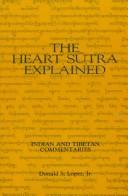
ISBN: 0887065902 0887065899 9780887065903 Year: 1988 Publisher: Albany State university of New York press
Abstract | Keywords | Export | Availability | Bookmark
 Loading...
Loading...Choose an application
- Reference Manager
- EndNote
- RefWorks (Direct export to RefWorks)
Tripiṭaka --- Criticism, interpretation, etc --- Tripiṭaka. --- Panya simgyŏng --- Hr̥daya --- Prajnaparamitas. --- Hannya shingyō --- Hannya haramitta shingyō --- Po je hsin ching --- Mo ho po je po lo ta ming chou ching --- Po je po lo mi to hsin ching --- Fo shuo po je po lo mi to hsin ching --- Po je po lo mi to na ching --- Mo ho po je sui hsin ching --- Pʻu pien chih tsang po je po lo mi to hsin ching --- Po je po lo mi to hsin ching pieh pen --- Po je po lo to hsin ching --- Sheng fo mu po je po lo mi to hsin ching --- Hsin ching --- Maka hannya haramitta shingyō --- Hannya shinkyō --- Bcom ldan ʼdas ma śes rab kyi pha rol tu phyin paʼi sñiṅ po --- Bo re bo luo mi duo xin jing --- Xin jing --- Fo shuo bo re bo luo mi duo xin jing --- Maha panya paramilta simgyŏng --- Criticism, interpretation, etc. --- Tripiṭaka.
| Listing 1 - 10 of 52 | << page >> |
Sort by
|

 Search
Search Feedback
Feedback About UniCat
About UniCat  Help
Help News
News